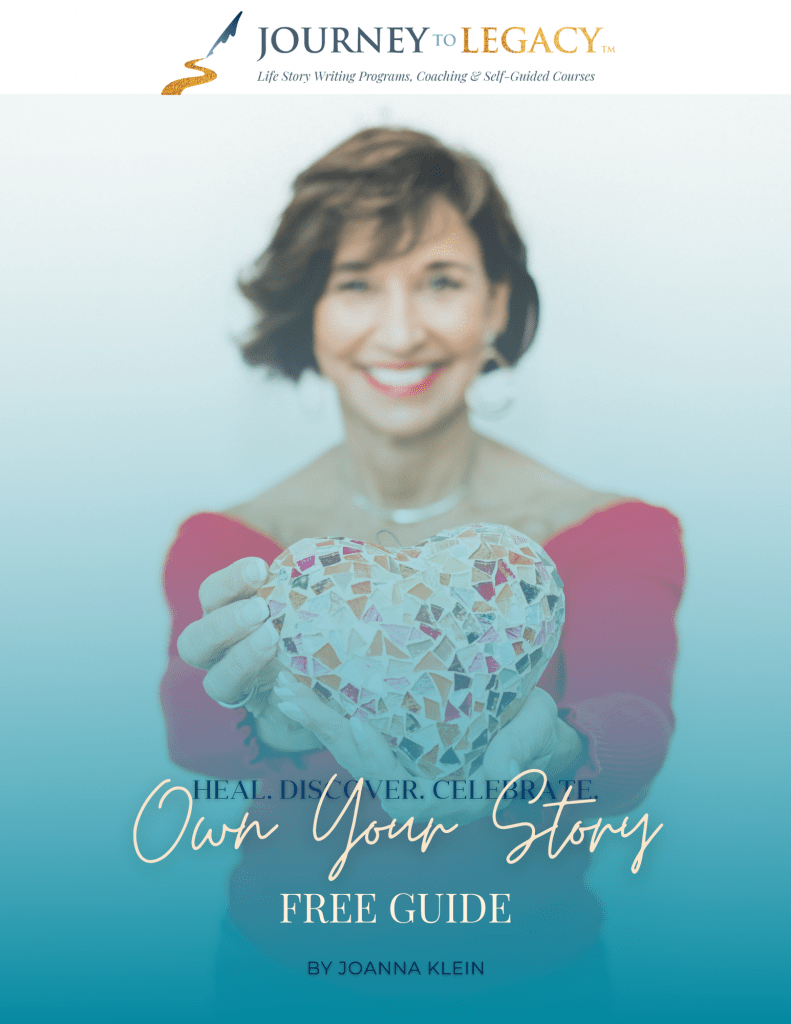When I was a kid, my favorite genre of books was historical novels. It made the people I was studying in my history classes come alive in a whole new way. They weren’t just people in the role of general, queen, slave, or statesman. They were human beings with feelings, goals, challenges, heartbreaks, and passion.
Now in my 60s, when I want to get lost in another world, my genre of choice is memoir. True stories about real people.
The personal story is the most powerful way for us to “feel” what another is going through.
I gain insight into another world, and I find myself feeling so much compassion, admiration, inspiration, and…
Intimidation.
Yes, even though I teach “life story writing”, sometimes reading a good memoir causes me to feel intimidated.
Most of the memoirs I read are so well written that I have to admit, from time to time I’ll compare my writing to theirs and think, “I’m not worthy of writing my stories.”
I know I’m not alone. Feeling “unworthy” is one of the main reasons women shy away from the idea of writing about their lives.
So many accomplished women like you feel a nudge to write their stories, but often get sidetracked by doubt or stuck in their own limiting beliefs . . .
- “Who would want to read my stories?”
- “I’m not a writer.”
- “My story would never be an Oprah Book Club pick.”
That last one is probably true, and that’s a good thing. Here’s why:
Life story writing – at least the way we approach it in Journey to Legacy – is different from the memoirs that wind up on Oprah’s list and bookstore shelves. Life story writing the way we do it is broader, more expansive.
And, yes, sometimes those feelings of self-doubt creep up, but we work through them. Because while we do keep the reader in mind as we review our lives, we’re first interested in your experience as the writer.
Does that come as a surprise?
The way I see it, all memoirs are life story writing, but not all life story writing strives to be a memoir.
I do love reading memoirs – those books about human struggle and perseverance and growth that take the reader deep into a certain aspect of the writer’s life. I’m thinking about Angela’s Ashes, Frank McCourt’s book about his poverty-stricken upbringing in an Irish Catholic family; Eat, Pray, Love, Elizabeth Gilbert’s travel and spiritual journey after a divorce; and Educated, Tara Westover’s book about breaking free from her isolated, survivalist upbringing and choosing, well, education.
So, how are they different?
Those are all wonderful books, but they’re limited. Limited by narrow themes, by focusing on only portions of the writers’ lives, and undoubtedly by the opinions of the publishing houses that brought them to market.
In life story writing, we don’t limit ourselves.
In life story writing, we write the stories that are in our hearts. Every story has its reason for being, and often you don’t know what that reason is until you start writing. We make space for the unknown, for the memories waiting to be remembered, for the conclusions we haven’t come to yet.
In life story writing, we may discuss the concept of theme, but no period of time or topic is off-limits as long as we’ve lived through it. Our theme is our life – our whole life.
The opportunities of life story writing
In life story writing, we hope our loved ones and descendants will find meaning in what we leave them – this is our legacy, after all – but our first aim is to learn about ourselves. To conduct a life review and grow from the lessons we uncover in our own stories. We are the first beneficiaries of our hard work.
In life story writing, we don’t write for glory, or for publishers. That’s too much pressure. We open ourselves up to the smaller stories of our lives, the ones a publisher might not see as worthwhile because some of the most magical life lessons are hiding in the least marketable moments.
Now, I’ve had clients with book-writing ambitions, and I don’t discourage that. In fact, I have a published author and editor on staff at Journey to Legacy to consult on all kinds of literary questions, including book aspirations. This is a writing course, and I take all of my clients’ goals to heart. Still, legacy with a small ‘l’ comes first. We’re creating something for ourselves and our loved ones in this writing course. If the big ‘L’ Legacy becomes a goal, in the form of a publishable memoir, we have ways to address that down the line.
In short, life story writing covers everything in our lives, and it’s for everyone. Everyone who has a desire to conduct a meaningful life review. Everyone who believes we all have a legacy worth leaving behind. And, everyone who’s willing to write that first sentence, and then the next one, and then the next one . . .



You express this beautifully.
Thank you, Susan!